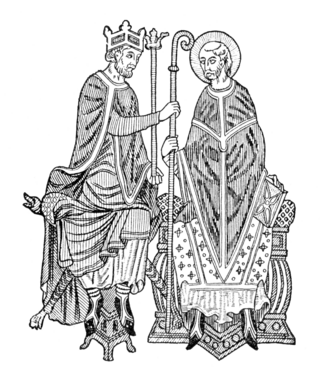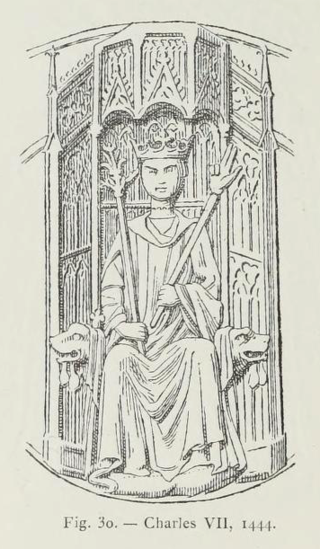
The Concordat of Worms, also referred to as the Pactum Callixtinum or Pactum Calixtinum, was an agreement between the Catholic Church and the Holy Roman Empire which regulated the procedure for the appointment of bishops and abbots in the Empire. Signed on 23 September 1122 in the German city of Worms by Pope Callixtus II and Emperor Henry V, the agreement set an end to the Investiture Controversy, a conflict between state and church over the right to appoint religious office holders that had begun in the middle of the 11th century.
The First Council of the Lateran was the 9th ecumenical council recognised by the Catholic Church. The first ecumenical council to be held in Western Europe & the first since the Great Schism of 1054, it was convoked by Pope Callixtus II in December 1122, immediately after the Concordat of Worms. The council sought to bring an end to the practice of the conferring of ecclesiastical benefices by people who were laymen, free the election of bishops and abbots from secular influence, clarify the separation of spiritual and temporal affairs, re-establish the principle that spiritual authority resides solely in the Church and abolish the claim of the Holy Roman Emperor to influence papal elections.

The Investiture Controversy or Investiture Contest was a conflict between the Church and the state in medieval Europe over the ability to choose and install bishops (investiture) and abbots of monasteries and the pope himself. A series of popes in the 11th and 12th centuries undercut the power of the Holy Roman Emperor and other European monarchies, and the controversy led to nearly 50 years of conflict.

The Pragmatic Sanction of Bourges, issued by King Charles VII of France, on 7 July 1438, required a General Church Council, with authority superior to that of the papacy, to be held every ten years, required election rather than appointment to ecclesiastical offices, prohibited the pope from bestowing and profiting from benefices, and forbade appeals to the Roman Curia from places further than two days' journey from Rome. The Pragmatic Sanction further stipulated that interdict could not be placed on cities unless the entire community was culpable. The king accepted many of the decrees of the Council of Basel without endorsing its efforts to coerce Pope Eugene IV.
The Gregorian Reforms were a series of reforms initiated by Pope Gregory VII and the circle he formed in the papal curia, c. 1050–80, which dealt with the moral integrity and independence of the clergy. The reforms are considered to be named after Pope Gregory VII (1073–85), though he personally denied it and claimed his reforms, like his regnal name, honoured Pope Gregory I.
A benefice or living is a reward received in exchange for services rendered and as a retainer for future services. The Roman Empire used the Latin term beneficium as a benefit to an individual from the Empire for services rendered. Its use was adopted by the Western Church in the Carolingian era as a benefit bestowed by the crown or church officials. A benefice specifically from a church is called a precaria, such as a stipend, and one from a monarch or nobleman is usually called a fief. A benefice is distinct from an allod, in that an allod is property owned outright, not bestowed by a higher authority.
Queen Anne's Bounty was a scheme established in 1704 to augment the incomes of the poorer clergy of the Church of England and by extension the organisation that administered the bounty.

The Appointment of Bishops Act 1533, also known as the Act Concerning Ecclesiastical Appointments and Absolute Restraint of Annates, is an Act of the Parliament of England.
The Declaration of the Clergy of France was a four-article document of the 1681 assembly of the French clergy. Promulgated in 1682, it codified the principles of Gallicanism into a system for the first time into an official and definitive formula.

The English Reformation Parliament, which sat from 3 November 1529 to 14 April 1536, established the legal basis for the English Reformation, passing major pieces of legislation leading to the break with Rome and increasing the authority of the Church of England. Under the direction of King Henry VIII of England, the Reformation Parliament was the first in English history to deal with major religious legislation, much of it orchestrated by, among others, the Boleyn family and Thomas Cromwell. This legislation transferred many aspects of English life away from the control of the Catholic Church to control under The Crown. This action both set a precedent for future monarchs to utilize parliamentary statutes affecting the Church of England; strengthened the role of the English Parliament; and provided a significant transference of wealth from the Catholic Church to the English Crown.
The Concordat of Bologna (1516) was an agreement between King Francis I of France and Pope Leo X that Francis negotiated in the wake of his victory at Marignano in September 1515. The groundwork was laid in a series of personal meetings of king and pope in Bologna, 11–15 December 1515. The concordat was signed in Rome on 18 August 1516. It marked a stage in the evolution of the Gallican Church.
The jus spolii, the Latin for right of spoil, was a claim of succession to the property of deceased clerics, at least such as they had derived from their ecclesiastical benefices.
The Apostolic Camera, formerly known as the Papal Treasury, was an office in the Roman Curia. It was the central board of finance in the papal administrative system and at one time was of great importance in the government of the States of the Church and in the administration of justice, led by the Camerlengo of the Holy Roman Church, originally known as camerarius (chamberlain).
Cathedraticum is a specified sum of money to be paid annually toward a bishop. It is a mark of honour and a sign of subjection to the cathedral church, from which its name is derived.
The Apostolic Datary was one of the five Ufficii di Curia in the Roman Curia of the Roman Catholic Church. It was instituted no later than the 14th AD. Pope Paul VI abolished it in 1967.
Canonical institution is a technical term of the canon law of the Catholic Church, meaning in practice an institution having full recognition and status within the Catholic Church.
In the canon law of the Catholic Church, canonical provision is the regular induction into a benefice.

First Fruits and Tenths was a form of tax on clergy taking up a benefice or ecclesiastical position in Great Britain. The Court of First Fruits and Tenths was established in 1540 to collect from clerical benefices certain moneys that had previously been sent to Rome.
The Concordats of Constance were five agreements between the Catholic Church and the "nations" of England, France, Germany, Italy and Spain in the aftermath of the Council of Constance (1414–18) that ended the Western Schism. The French and German concordats were signed on 15 April 1418, the Spanish on 13 May and the English on 12 July. The Italian agreement is lost. The delegates to the council had sat as five nations—England, France, Germany, Italy and Spain—each with one vote. On 21 March 1418, the concordats were approved in advance by the council as conforming to and fulfilling the decrees of 30 October 1417.
The Concordat of 1169 was an agreement between the Kingdom of Hungary and the Papal States, signed by Stephen III of Hungary and Cardinal Manfred of Lavagna, the papal legate of Pope Alexander III in Veszprém or Esztergom in 1169.







